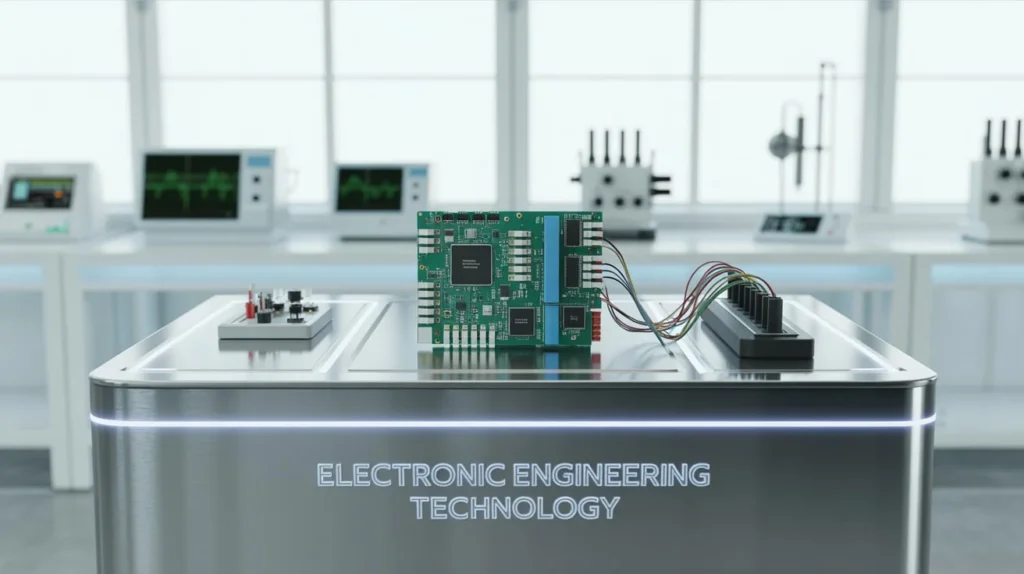Electronic engineering technology is a field that combines engineering principles with practical skills to design, develop, and maintain electronic systems. It bridges the gap between theoretical electronics and hands-on application, making it essential in today’s tech-driven world. From microchips in smartphones to control systems in industrial machines, this technology drives modern life forward.
Professionals in this area work on projects that touch nearly every industry. They ensure that devices and systems are not only functional but also efficient, safe, and reliable. As industries evolve, the demand for skilled electronic engineering technologists continues to grow.
The Role of Electronic Engineering in Modern Society
In today’s digital age, Electronic Systems Engineering is at the heart of innovation. It drives advancements in communication, healthcare, manufacturing, and transportation. By blending technical expertise with practical skills, it bridges the gap between design concepts and real-world applications.
Professionals in this field work to create systems where hardware and software function seamlessly together. From developing life-saving medical devices to enhancing smart infrastructure, their contributions impact everyday life. Precision, efficiency, and innovation are always at the forefront.
The possibilities for application are limitless, ranging from renewable energy solutions to advanced automation. With a constant focus on safety, sustainability, and global problem-solving, electronic technology continues to shape a brighter and more connected future.
Core Skills Required in Electronic Engineering
To succeed in Electronic Systems Engineering, professionals need a mix of technical knowledge and problem-solving skills. They must understand both the theory and the practical side of electronics, ensuring that ideas can be turned into working solutions.
Key abilities include:
- Circuit design and analysis
- Microcontroller programming
- Troubleshooting and repair
- Embedded systems development
- Understanding of digital and analog electronics
- Proficiency in using electronic testing tools
Applications of Electronic Engineering Across Industries

Electronic engineering extends far beyond a single industry, influencing nearly every part of modern life. From smartphones that connect us to satellites that explore space, it underpins both everyday convenience and cutting-edge innovation. Its reach ensures continuous progress across multiple sectors.
In manufacturing, it enables automation, precision, and quality control, making production faster and more efficient. In healthcare, it powers advanced diagnostic tools, patient monitoring systems, and life-support technologies. These solutions improve outcomes and enhance patient care worldwide.
The renewable energy sector also benefits, with Electronic Systems Engineering optimizing solar, wind, and other sustainable power systems. By improving efficiency and reliability, it supports the shift toward cleaner energy. Its diverse applications make it one of today’s most vital and transformative fields.
Education and Career Pathways
Pursuing a career in electronic engineering usually starts with specialized education. Many professionals earn associate or bachelor’s degrees in the field, gaining both classroom knowledge and practical lab experience.
Graduates can work as:
- Electronics technologists
- Field service engineers
- Test engineering specialists
- Automation technicians
- Embedded systems developers
Challenges Faced in Electronic Engineering Technology
Digital Electronics Technology offers immense opportunities, but it also presents significant challenges. Rapid technological advancements require professionals to update their knowledge and skills continuously. Staying current with evolving tools, software, and industry standards is essential for success.
Another challenge lies in designing devices that meet high-performance expectations while remaining sustainable. Technologists must develop solutions that reduce environmental impact without compromising efficiency or reliability. This balance is becoming increasingly important in modern innovation.
Ethical responsibility is also a key consideration, mainly as technology influences global industries and daily life. Professionals must ensure their designs prioritize safety, fairness, and long-term sustainability. Navigating these challenges is crucial to shaping a responsible technological future.
Emerging Trends in Electronic Systems Engineering
As technology evolves, so does the scope of digital electronic engineering. Current trends are shaping how devices are built, maintained, and upgraded. Professionals must keep up with these changes to stay competitive.
Some emerging areas include:
- Internet of Things (IoT) integration
- Wearable medical devices
- Energy-efficient circuit designs
- Advanced robotics and automation
- Artificial intelligence applications in electronics
Future Prospects
The future of electronic technology looks promising. With industries like renewable energy, healthcare tech, and smart manufacturing expanding, the need for skilled technologists will only increase.
This growth will lead to more career opportunities, higher salaries, and greater innovation. Professionals who stay updated with trends will remain in high demand across the globe.
Importance of Continuous Learning in Electronic Engineering
In a field as dynamic as Digital Electronics Technology, continuous learning is crucial. Advancements in microelectronics, sensors, and wireless communication require professionals to upskill regularly.
Those who invest in certifications, workshops, and advanced degrees often gain a competitive edge. Lifelong learning ensures not only career growth but also the ability to contribute meaningfully to technological progress.
Conclusion:
Electronic engineering technology is the backbone of modern innovation, powering everything from advanced manufacturing to smart devices. It provides the technical expertise and practical skills that drive industries forward, enabling groundbreaking solutions that improve efficiency, safety, and quality of life.
This field thrives on a blend of creativity and precision, making it ideal for those who enjoy problem-solving and hands-on work. Technologists in this area are not only innovators but also vital contributors to sectors such as healthcare, energy, communication, and automation. Their ability to design, develop, and maintain complex systems keeps modern society functioning and evolving.
As industries continue to transform in response to global challenges, the demand for skilled professionals in electronic technology will only grow. For individuals passionate about technology and eager to make a tangible difference, this career offers limitless opportunities.

